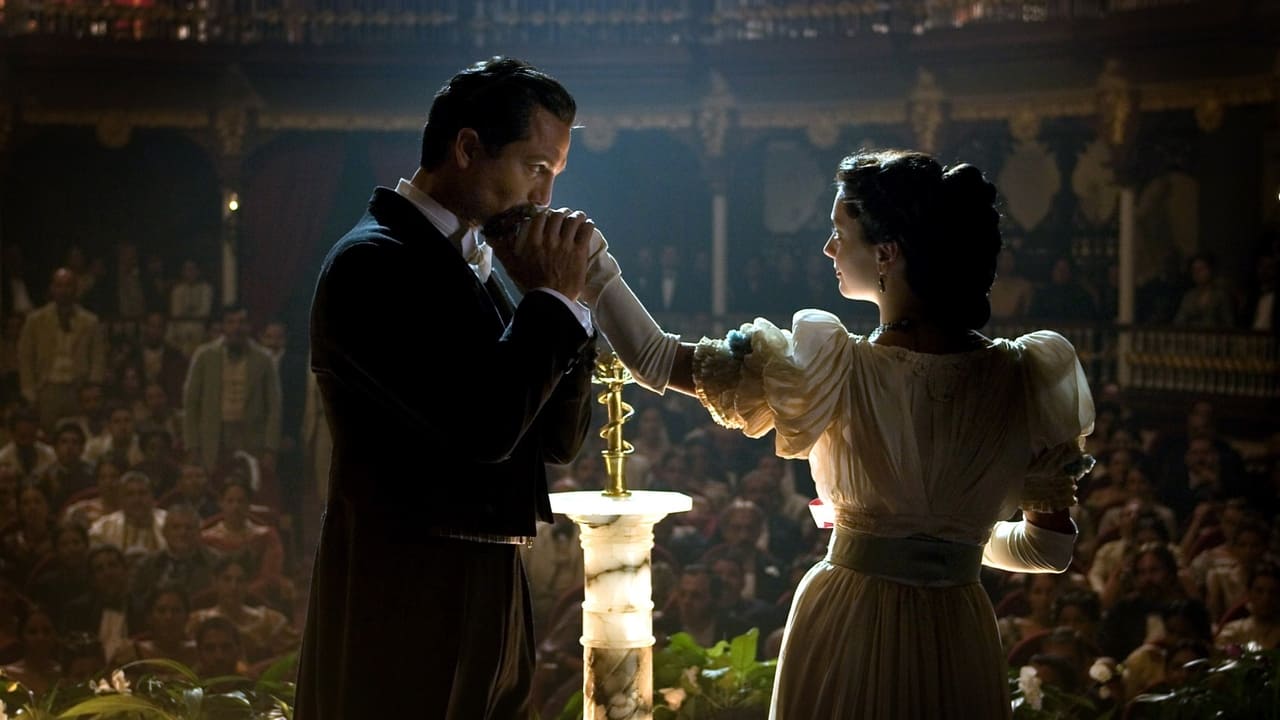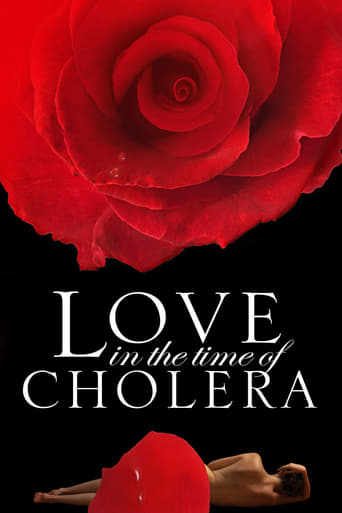

Let me start by saying that "Love In The Time of Cholera" is one of the finest pieces of literature I've ever had the honour of reading. The complexity of the characters in the context of the epic love story, and, of course, García Márquez' uniquely masterful, creative, nuanced, and haunting storytelling are as astoundingly difficult to get out of your head as they are to even begin thinking about portraying on film. So, when I set out to watch this, I expected the details and the rich colour of the book to be present only to a certain extent, but I didn't expect this. The characters were gone, too.Florentino, the boy who is all but destroyed by an acutely-debilitating, chronically-present, obsessive, dangerous, manic and unconditional love for Fermina, was very, very different in the film. He is extremely shallow instead of profoundly observant, borderline psychotic instead of passionate, and disgustingly sleazy instead of empty and sadly seductive. I originally saw his promiscuity as a coping mechanism-turned-addiction, by which the author had free leeway to explore sexual desire and physical love in its entire spectrum, from the desperate, to the comical, to the terrifying, to the paraphilic (and, yes, that's a term I just coined because I wanted to vomit when reading about Florentino and his 14-year-old ward-- which, I suspect, was the intended effect). It's very important to note, too, that in the novel Gabo takes on this subject very carefully and skilfully, with a sharp contrast in tone, symbolism and pacing that sets it worlds apart from the romantic kind of love that Florentino never feels for anyone but Fermina. In the film, however, all of the details were missing, and the previous analysis turns to dust -- why he's promiscuous, with whom and why. I daresay we never even understand the reason why he loves Fermina the way he does in the first place (which takes reading the entire book). In my opinion, this is due to poor characterisation of both on screen.Fermina is a hard character to grasp, a tough nut to crack in the book, and I suspect that's her appeal. Florentino never fully understands her -- why she's so cold AND passionate, why she's so quiet AND so emotionally open at the same time. In the film, though, she's easy: a shallow woman who plays hard to get. Without her reactions for example, to her aunt's dismissal by her father, to the long trip to her cousin's, to Europe and everything it holds, and, finally, to being married to a man she loves but not in the way that makes her happy, the audience struggles to understand why she even deserves the title of Crowned Goddess. She's boring, at best.Juvenal Urbino, the doctor who marries Fermina, much to Florentino's torture, doesn't fare much better in this adaptation. There's barely anything to him but his money and status. In the book, he's a very intelligent man who truly cares about his town and its health and culture, a highly organised snob and a decent husband. We just get the "decent husband" part with this film. He basically makes a deal with Lorenzo Daza and marries his daughter. It's not made clear that he loves her, whereas in the book, his affair being the only exception, the reader never doubts the kind of easy, comfortable, warm kind of love they have for each other till his dying day. Marital love, then, is not to be seen.Finally, Lorenzo wasn't much of a brutish criminal in this, just an arsehole father, and characters like Euclides were completely missing.Much is to be said FOR this film, though. It follows the story lines well, albeit with important missing bits. The music is good. The setting (whilst not correct in the sense that the story is set in a typical Colombian coastal tiny town and NOT a big city like Cartagena), is gorgeous. The acting was far from exceptional, but passable. I really liked the ending, but was annoyed by the fact that it was Fermina and not the Captain asking how long they were going to be on the boat.This adaptation is faithful, and I'm giving it 4 stars instead of 3, because it's really unfair to expect filmmakers to translate phrases like "cataclysm of love" and indeed stories as complex as this into the screen. Gabo was THE master of Magical Realism and we'll be hard-pressed to find a film that does his works justice. He, of course, is very much missed.
... View MoreThis seemed like comedy it was so bad, no chemistry , bad makeup, bad acting, and was so confusing. the weird sex scenes just creeped me out. where she flys onto him and bangs him outta nowhere, having sex when bombs are going off. i thought i was suppose to laugh.i turned it off so i cant give a good review. but i doubt it got better. after 40-60 minutes of this movie i couldn't take it anymore, and was making me angry how bad and confusingly weird this was. i haven't read the book, and the movie has ruined me wanted to. but i hope its way different then this movie.Save yourself from torture , just read the book and pretend this movie never happened
... View MoreBooks can be good or bad, what counts in a film are the characters and the visual impact as the script unfolds. This is a glorious movie, the star is not the book but Cartagena, the landscape and a time frame, revealed in the costumes, the production, the streets and buildings, the intimacy of the interiors of a diversity of dwellings. As much as I love the literature of García Márquez and adored the book it only provides the essential premise, which is totally machismo and completely tongue in cheek. Only a male would assert the purity of heart of another male, who has seduced or been seduced by 622 women while preserving his unblemished love for an inaccessible childhood sweetheart. Good casting, good direction, wonderful music. This is a great movie experience.
... View MoreThis film relates accurately the main events that compose the story, but fails to reflect the ironies and motifs that make the novel so elaborate and engaging. Florentino's courtship of Fermina, the obstacles they face and the resolution of their love affair are clearly depicted in the film, but some of the emotions and reactions that the characters experience are not portrayed in the film and therefore the story lacks some of the meaning that the author implied in his writings. The writing style of García Márquez is very complex and therefore very difficult to capture in film; the use of a narrator could have helped to illustrate some of the highlights of the book that the film lacks. This film is worthwhile after having read the book; otherwise it is just a love story full of eccentric characters and fantasy worthy of Hollywood, with an intriguing but predictable series of events and a happy ending.
... View More